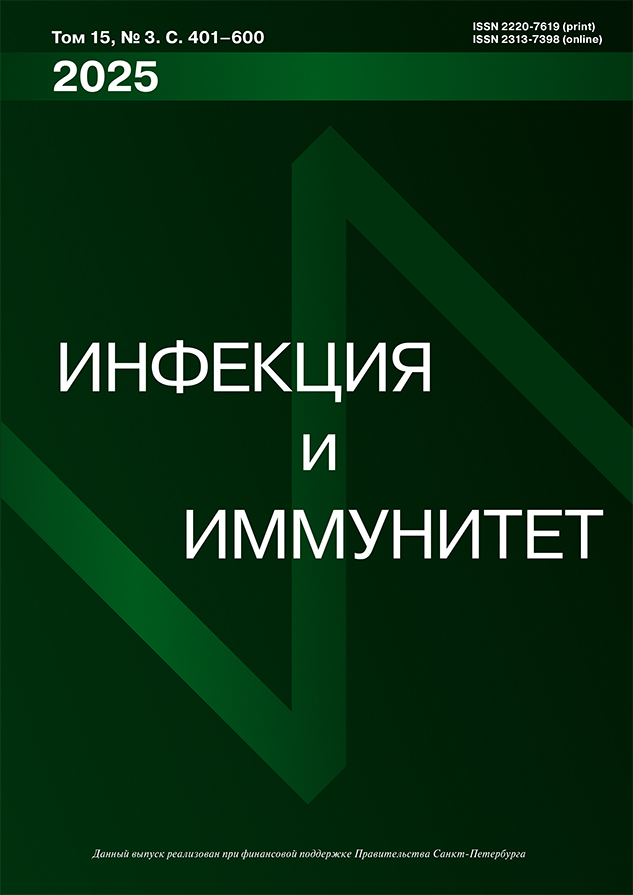Корь в Гвинейской Республике в 2019–2020 гг.: эпидемические особенности и популяционный иммунитет
- Авторы: Лаврентьева И.Н.1, Бичурина М.А.1, Антипова А.Ю.1, Камара Д.2, Магассуба Н.2, Егорова С.А.1, Тотолян А.А.1
-
Учреждения:
- НИИ эпидемиологии и микробиологии имени Пастера
- Университет имени Гамаля Абдель Насера
- Выпуск: Том 11, № 6 (2021)
- Страницы: 1179-1184
- Раздел: КРАТКИЕ СООБЩЕНИЯ
- Дата подачи: 25.05.2021
- Дата принятия к публикации: 28.09.2021
- Дата публикации: 11.10.2021
- URL: https://iimmun.ru/iimm/article/view/1739
- DOI: https://doi.org/10.15789/2220-7619-MIT-1739
- ID: 1739
Цитировать
Полный текст
Аннотация
Введение. В связи с эпидемией лихорадки Эбола в государствах Западной Африки, в том числе и в Гвинейской Республике, имело место нарушение программы иммунизации против кори. Доля серонегативных к вирусу кори в 2017 г. составила 52,4% от числа обследованных лиц. В 2018 г. была выявлена высокая доля заболевших корью среди детей 1–5 лет (61,6%). Для купирования вспышки в 2018 г. в Гвинейской Республике проведена кампания дополнительной иммунизации населения префектур Конакри и Нзерекоре. Цель настоящего исследования — изучение эпидемической ситуации по кори и оценка популяционного иммунитета к вирусу кори в Гвинейской Республике в 2019–2020 гг. Материалы и методы. На наличие специфических антител ретроспективно были тестированы 1697 образцов сывороток крови жителей разных регионов страны, в возрасте от 7 месяцев до 76 лет, полученных в 2019–2020 гг. Использованы ИФА-тест-системы Anti-Measles Virus ELISA (IgM) Euroimmun и Anti-Measles Virus ELISA (IgG) Euroimmun (Германия). Наличие в сыворотке крови IgM-антител к вирусу кори оценивали как острую коревую инфекцию. Статистический анализ выполняли с помощью пакета программ Statistica 6.0. Результаты. На наличие IgM-корь исследовано 638 сывороток крови, в 46,6% случаев диагноз подтвержден лабораторно. Наибольшая доля от общего числа заболевших (61,6%) — дети 1–4 лет. Вторая по значимости возрастная группа 5–9 лет, третья — дети до 1 года: 18,5 и 11,8% от общего числа заболевших соответственно. Корь регистрировалась у привитых в 7,4% от общего числа лабораторно подтвержденных случаев. На IgG-корь обследовано 1059 человек. Самый низкий показатель серопревалентности установлен среди детей до 4 лет (47,8%), самый высокий (85,5%) — среди лиц 40 лет и старше. Заключение. Корь в Гвинейской Республике остается слабо контролируемой инфекцией. Как и в предыдущие годы наблюдения (2017–2018 гг.), дети до 5 лет являются наиболее уязвимой когортой населения, несмотря на проведенную в 2018 г. в ряде регионов страны кампанию дополнительной иммунизации. Еще больше проблем с контролем коревой инфекции в Гвинее ожидается начиная с 2021 г., поскольку наряду с эпидемией COVID-19 в стране вновь регистрируется лихорадка Эбола. Гвинейская Республика особо остро нуждается в помощи мирового сообщества для реализации программы ВОЗ по элиминации кори в глобальном масштабе.
Ключевые слова
Об авторах
И. Н. Лаврентьева
НИИ эпидемиологии и микробиологии имени Пастера
Автор, ответственный за переписку.
Email: pasteur.lawr@mail.ru
Лаврентьева Ирина Николаевна – доктор медицинских наук, заведующая лабораторией экспериментальной вирусологии.
197101, Санкт-Петербург, ул. Мира, 14.
Тел.: 8 (812) 232-94-11 (служебн.), 8 921 341-05-01 (моб.)
РоссияМ. А. Бичурина
НИИ эпидемиологии и микробиологии имени Пастера
Email: poliospb@nr3854.spb.edu
Бичурина Маина Александровна - доктор медицинских наук, заведующая вирусологической лабораторией центра по элиминации кори и краснухи.
Санкт-Петербург.
РоссияА. Ю. Антипова
НИИ эпидемиологии и микробиологии имени Пастера
Email: anti130403@mail.ru
Антипова Анастасия Юрьевна - кандидат биологических наук, научный сотрудник лаборатории экспериментальной вирусологии.
Санкт-Петербург.
РоссияДж. Камара
Университет имени Гамаля Абдель Насера
Email: Jacob2240@gmail.com
Камара Джакоб - научный сотрудник лаборатории геморрагических лихорадок Университета Гамаля Абдель Насера.
Конакри.
ГвинеяН’Ф. Магассуба
Университет имени Гамаля Абдель Насера
Email: cmagassouba01@gmail.com
Магассуба Н’Фалли - кандидат биологических наук., заведующий лабораторией геморрагических лихорадок Университета Гамаля Абдель Насера.
Конакри.
ГвинеяС. А. Егорова
НИИ эпидемиологии и микробиологии имени Пастера
Email: fake@neicon.ru
Доктор медицинских наук, заместитель директора по инновациям.
Санкт-Петербург.
РоссияА. А. Тотолян
НИИ эпидемиологии и микробиологии имени Пастера
Email: totolian@spbraaci.ru
Тотолян Арег Артемович - доктор медицинских наук, профессор, академик РАН, директор НИИ эпидемиологии и микробиологии имени Пастера.
Санкт-Петербург.
РоссияСписок литературы
- Бичурина М.А., Тимофеева Е.В., Железнова Н.В., Игнатьева Н.А., Шульга С.В., Лялина Л.В., Дегтярев О.В. Вспышка кори в детской больнице Санкт-Петербурга в 2012 году // Журнал инфектологии. 2013. Т. 5, № 2. С. 96–102. doi: 10.22625/2072-6732-2013-5-2-96-102
- Камара Дж., Антипова А.Ю., Бичурина М.А., Зарубаев В.В., Магассуба Н’Ф., Лаврентьева И.Н. Осуществление программы элиминации кори в Aфриканском регионе ВОЗ // Инфекция и иммунитет. 2019. Т. 9, № 3–4. С. 449–456. doi: 10.15789/22207619201934449456
- Лаврентьева И.Н., Бичурина М.А., Антипова А.Ю., Камара Ж., Магассоуба Н. Выявление случаев кори в Гвинейской Республике в 2017–2018 гг. // Инфекция и иммунитет. 2020. Т. 10, № 3. С. 570–574. doi: 10.15789/2220-7619-DOM-1333
- Попова А.Ю., Бичурина М.А., Лаврентьева И.Н., Железнова Н.В., Антипова А.Ю., Щербакова С.А., Буаро М.Й., Тотолян А.А. Изучение уровня иммунитета к вирусу кори в отдельных группах населения Гвинейской Республики в рамках Глобальной программы элиминации кори. Сообщение 1 // Инфекция и иммунитет. 2016. Т. 6, № 4. С. 353–358. doi: 10.15789/2220-7619-2016-4-353-358
- Попова А.Ю., Бичурина М.А., Лаврентьева И.Н., Железнова Н.В., Антипова А.Ю., Щербакова С.А., Буаро М.Й., Тотолян А.А. Изучение уровня иммунитета к вирусу кори в отдельных группах населения Гвинейской Республики в рамках Глобальной программы элиминации кори. Сообщение 2 // Инфекция и иммунитет. 2017. Т. 7, № 1. С. 79–84. doi: 10.15789/2220-7619-2017-1-79-84
- Masresha B.G., Dixon M.G., Kriss J.L., Katsande R., Shibeshi M.E., Luce R., Fall A., Dosseh A.R.G.A., Byabamazima Ch.R., Dabbagh A.J., Goodson J.L., Mihigo R. Progress toward measles elimination — African Region, 2013–2016. MMWR, 2017, vol. 66, no. 17, рр. 436–443. doi: 10.15585/mmwr.mm6617a2
- Roberts L. How COVID hurt the fight against other dangerous diseases. Nature, 2021, vol. 592, no. 7855, pp. 502–504. doi: 10.1038/d41586-021-01022-x
- Takahashi S., Metcalf J.E., Ferrari M.J., Moss W.J., Truelove Sh.A., Tatem A.J., Grenfell B.T., Lessler J. Reduced vaccination and the risk of measles and other childhood infections post-Ebola. Science, 2015, vol. 347, no. 6227, pp. 1240–1242. doi: 10.1126/science.aaa3438
- WHO. Eliminating measles and rubella and preventing congenital rubella infection: WHO European Region strategic plan 2005– 2010. Copenhagen: WHO, 2005. 34 p.
- WHO. Global measles and rubella strategic plan: 2012–2020. Geneva: WHO, 2012. 77 p.
- WHO. Provisional monthly measles and rubella data. Country slides (Measles). URL: https://www.who.int/teams/immunization-vaccines-and-biologicals/immunization-analysis-and-insights/surveillance/monitoring/provisional-monthly-measles-and-rubella-data (18.05.2021)
- WHO. Reported measles cases and incidence rates by WHO Member States, as of 10 Oct 2019. URL: https://www.who.int/immunization/monitoring_surveillance/burden/vpd/surveillance_type/active/measles_monthlydata/en (22.10.2019)
Дополнительные файлы







